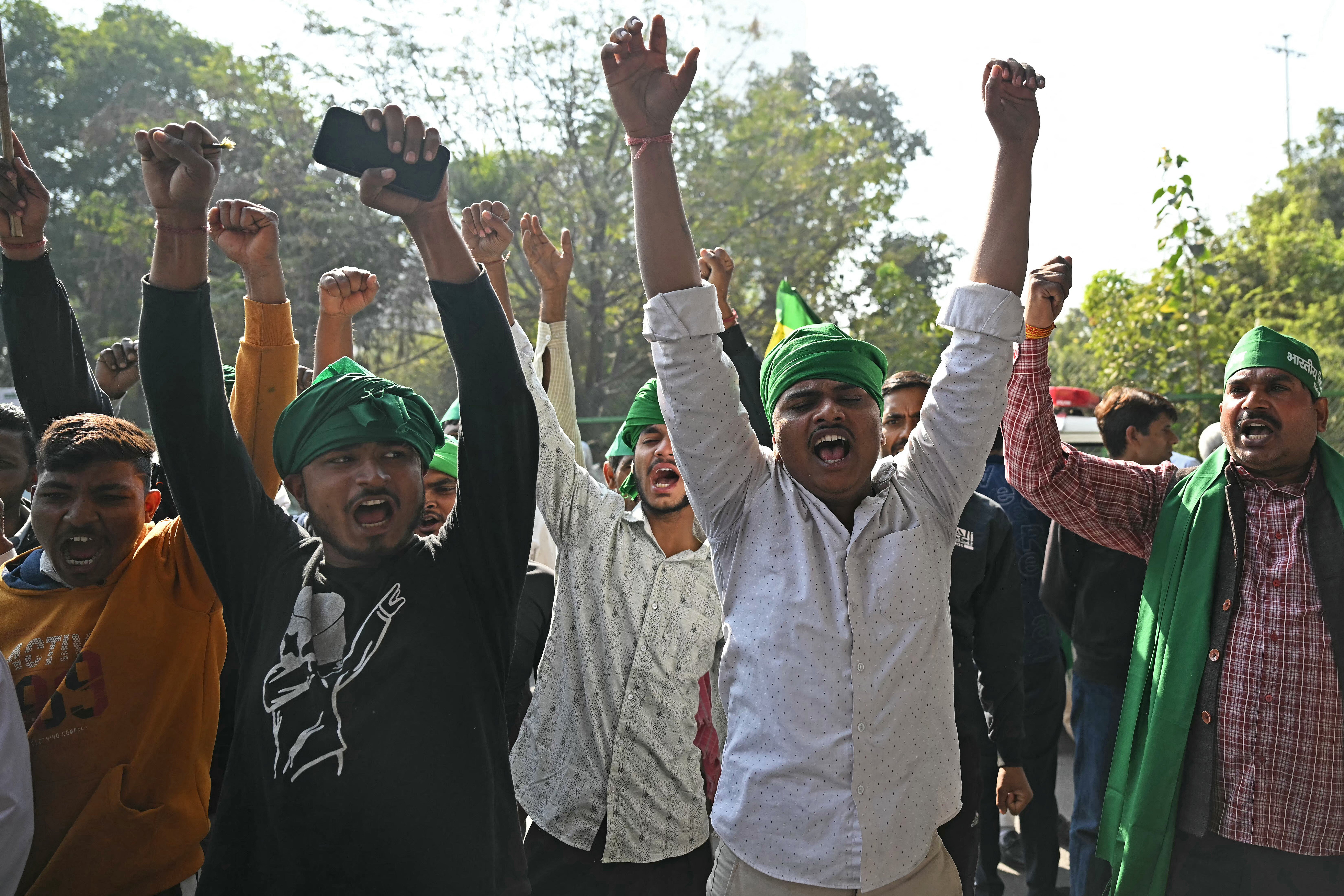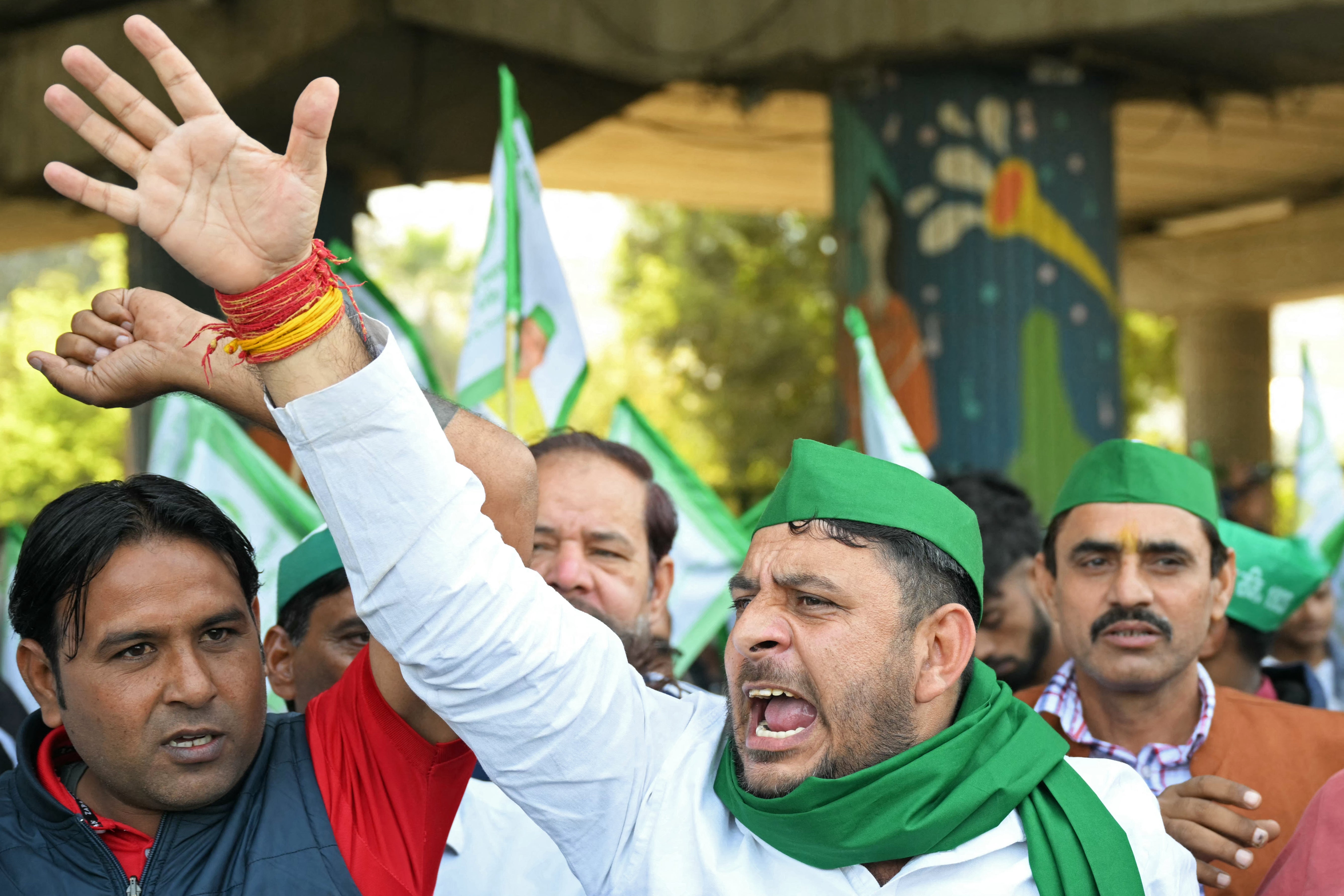Security has been beefed up in Delhi as the Indian capital braces for a fresh round of protests by farmers who have arrived at the border, threatening to bring the city to a standstill.
Farmer associations have called for a march on Delhi to press their demands, including fair compensation for their land acquired for developmental projects by the government.
Authorities have shut the city’s borders to keep the farmers from getting in. They have appeared determined to avoid a repeat of the 2021 protests which saw tens of thousands of farmers camp outside the capital for over a year, enduring a harsh winter and a devastating Covid surge.
The latest protest started on 25 November when hundreds of farmers gathered under the banners of the Bharatiya Kisan Union and the Samyukt Kisan Morcha. As their numbers swelled to over 20,000, the protest leaders called for a march on the capital on Monday.
As they closed in on the city, the protesters knocked down police barricades and shouted slogans against the government. Police, however, managed to keep them from moving beyond the satellite city of Noida.
The protest caused massive traffic snarls, disrupting daily life for thousands of people who travel between the two cities for work.
“The farmers have been stopped at the Mahamaya flyover. They want to head towards Delhi because the solution will come from Delhi only,” Rakesh Tikait, a top farmer leader, said.
“Police are stopping the farmers whereas the farmers want to head towards Delhi.”

Police have blocked key entry points to the capital, including highways and arterial roads, leading to long delays and diversions.
The Noida police commissioner said they have deployed 5,000 personnel at checkpoints, and 1,000 more for law enforcement management.
Why are farmers marching again?
A key demand of the farmers from the northern Uttar Pradesh state who have arrived at the capital’s border is the allocation of 10 per cent of developed plots promised to farmers who were displaced by government land acquisition.
The demand goes back many years to when the government acquired large tracts of agricultural land for urbanisation projects and promised developed plots to the affected farmers.

The farmers claim they have not been received the promised plots or the additional 64 per cent compensation for the acquired land.
They are also asking for jobs and rehabilitation benefits for the children of landless farmers as well as resettlement of affected communities.
The protests of four years ago in contrast were driven by a set of contentious agriculture reform laws that the Narendra Modi government was eventually forced to repeal.
The latest protests are expected to grow in the coming days as farmers from the neighbouring state of Punjab are expected to launch a march on Delhi from 6 December.
Punjab’s farmers have been regrouping since the start of the year saying the central government has failed to meet some of their key demands from the previous protests, which they led, despite the farm laws being repealed.
In the wake of the 2021 protests, the government promised to set up a committee to implement minimum support prices for all crops. The farmers say the government has failed to act on it.
The implementation of the minimum support price, the minimum rate at which farmers sell their crops to the government, is a key demand of the farmers, who say it protects them from market fluctuation and offers stability and income security.
Sukhvinder Kaur, general secretary of Bhartiya Kisan Union Krantipari, told The Independent the government should give a legal guarantee for minimum support price as the farmers do not get the assured prices despite promises.
In addition, the farmers are demanding a complete waiver of agricultural debts.
Indebtedness has long been a key electoral issue in India’s agricultural heartland—Punjab, Uttar Pradesh and Haryana—where hundreds of farmers burdened by debt have tragically taken their lives.
The Indian government has waived farm loans twice since independence in 1947, but has never implemented a blanket waiver.
The farmers also want the government to provide pensions to elderly farmers of up to Rs 10,000 per month.
Ms Kaur said these are very basic demands that the government has continued to ignore since the farm laws were repealed.
“The government has not done anything on the committee it promised to form on MSP. We are planning to march on Delhi on 6 December and will not return till our demands are met,” she said.







